Unit 7 Life is full of the unexpected. Section B (2a-Self Check)基础必会清单及知识闯关(含答案)
文档属性
| 名称 | Unit 7 Life is full of the unexpected. Section B (2a-Self Check)基础必会清单及知识闯关(含答案) |
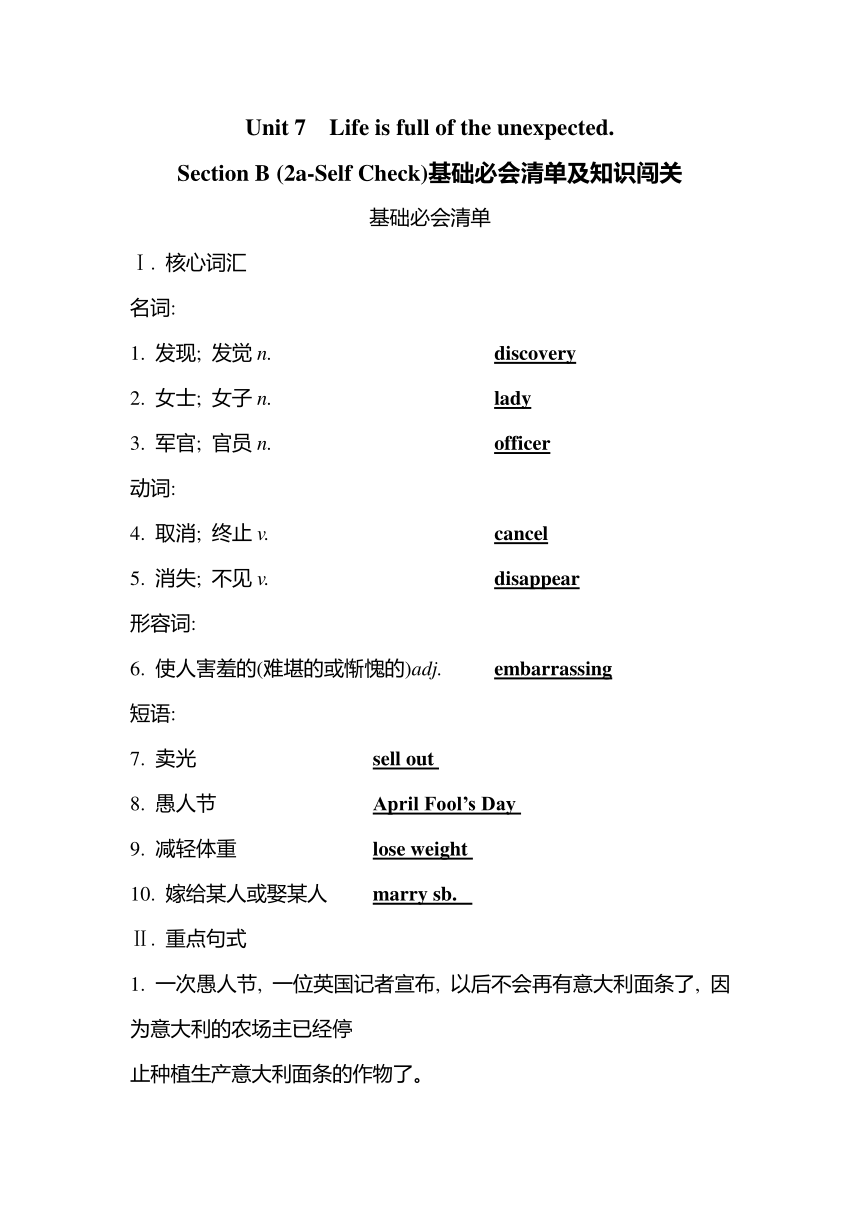
|
|
| 格式 | docx | ||
| 文件大小 | 646.7KB | ||
| 资源类型 | 教案 | ||
| 版本资源 | 鲁教版 | ||
| 科目 | 英语 | ||
| 更新时间 | 2024-02-07 10:09:49 | ||
图片预览

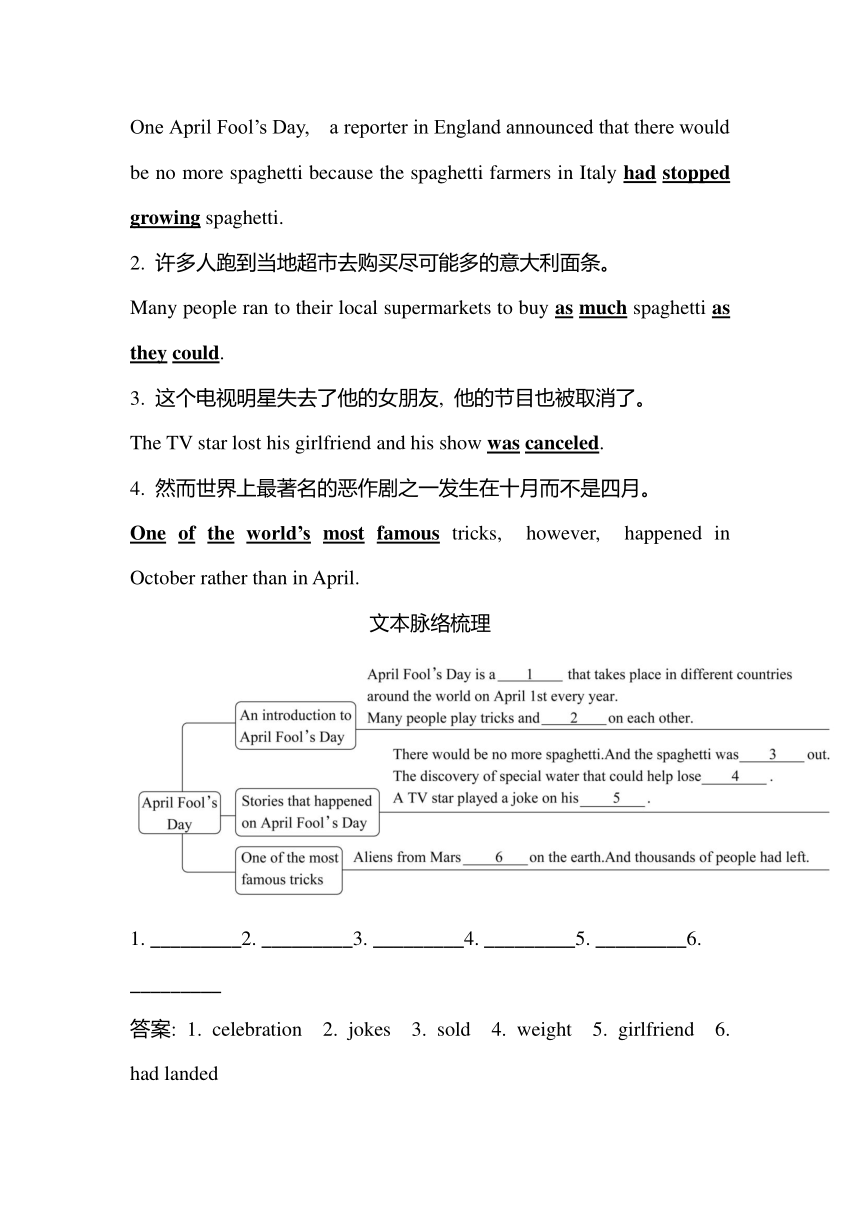
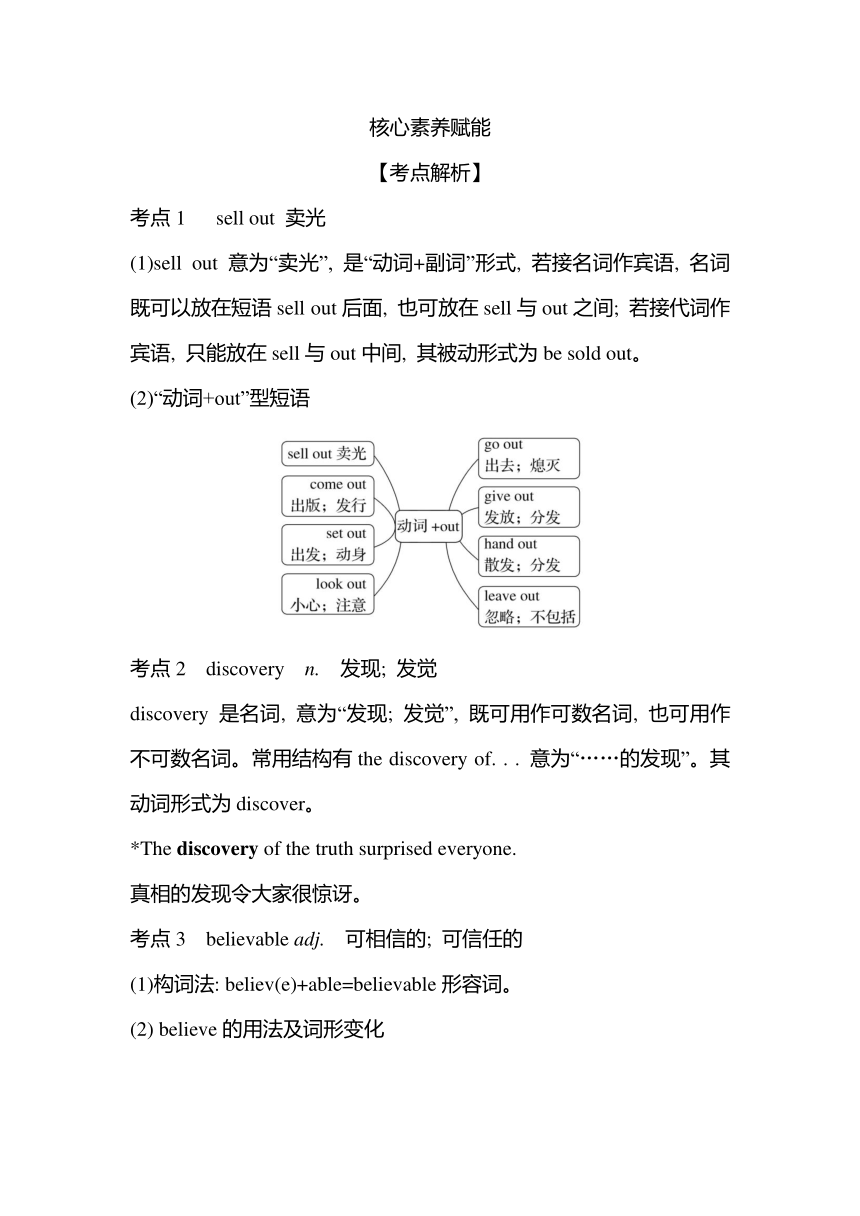
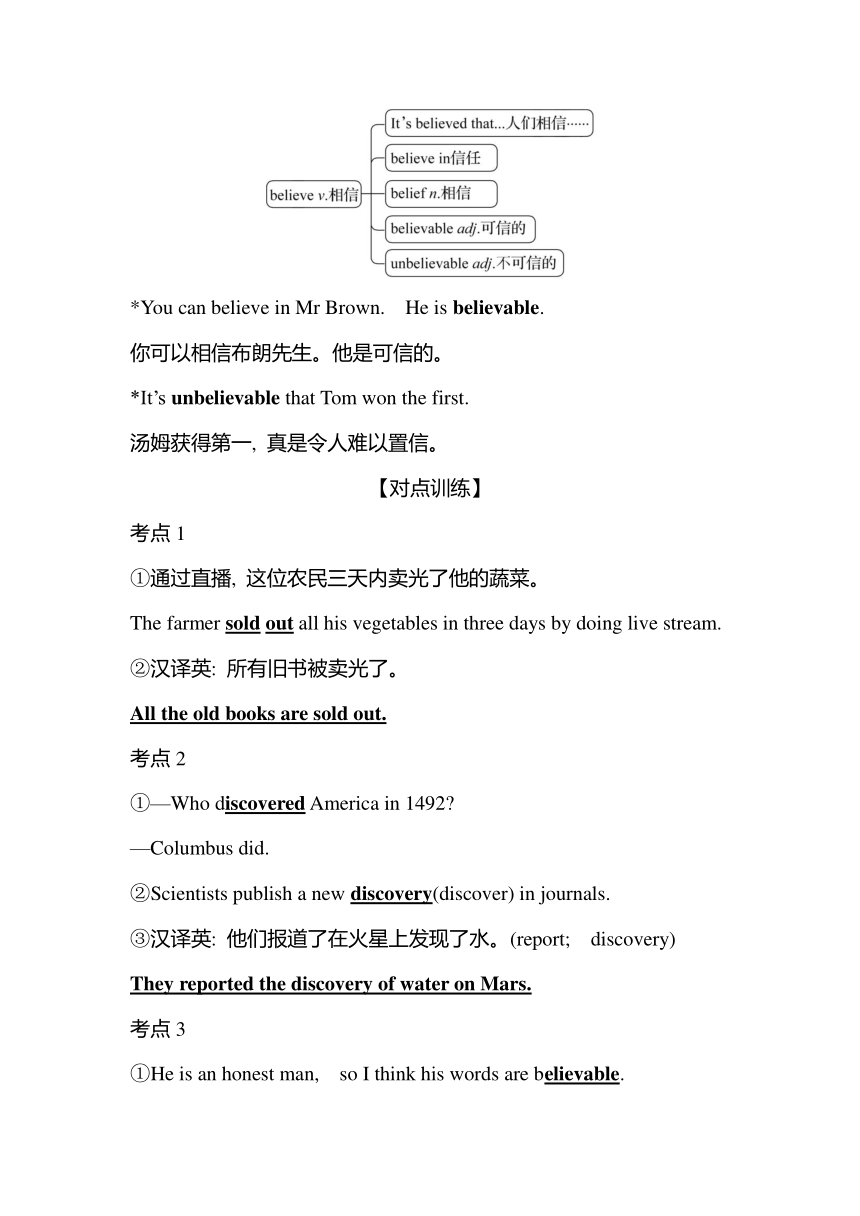
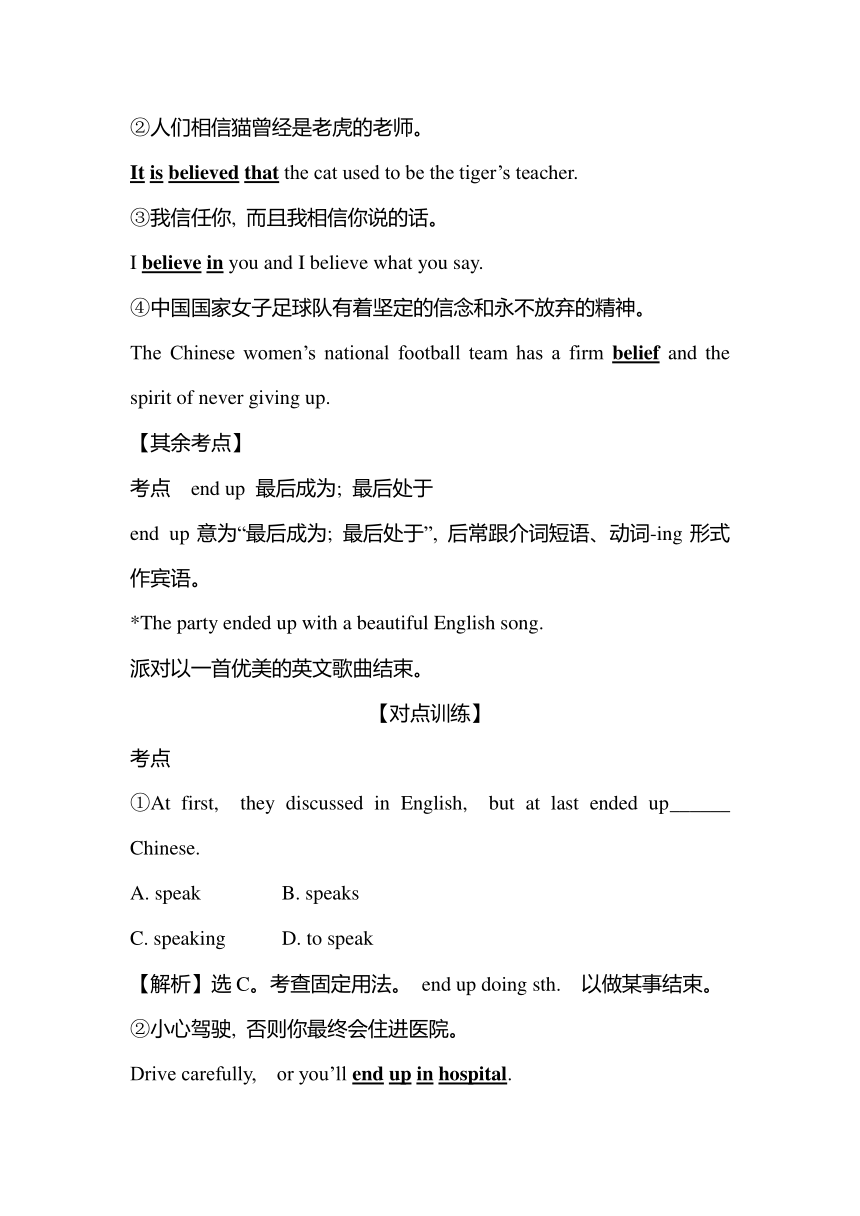
文档简介
Unit 7 Life is full of the unexpected.
Section B (2a-Self Check)基础必会清单及知识闯关
基础必会清单
Ⅰ. 核心词汇
名词:
1. 发现; 发觉n. discovery
2. 女士; 女子n. lady
3. 军官; 官员n. officer
动词:
4. 取消; 终止v. cancel
5. 消失; 不见v. disappear
形容词:
6. 使人害羞的(难堪的或惭愧的)adj. embarrassing
短语:
7. 卖光 sell out
8. 愚人节 April Fool’s Day
9. 减轻体重 lose weight
10. 嫁给某人或娶某人 marry sb.
Ⅱ. 重点句式
1. 一次愚人节, 一位英国记者宣布, 以后不会再有意大利面条了, 因为意大利的农场主已经停
止种植生产意大利面条的作物了。
One April Fool’s Day, a reporter in England announced that there would be no more spaghetti because the spaghetti farmers in Italy had stopped growing spaghetti.
2. 许多人跑到当地超市去购买尽可能多的意大利面条。
Many people ran to their local supermarkets to buy as much spaghetti as they could.
3. 这个电视明星失去了他的女朋友, 他的节目也被取消了。
The TV star lost his girlfriend and his show was canceled.
4. 然而世界上最著名的恶作剧之一发生在十月而不是四月。
One of the world’s most famous tricks, however, happened in October rather than in April.
文本脉络梳理
1. _________2. _________3. _________4. _________5. _________6. _________
答案: 1. celebration 2. jokes 3. sold 4. weight 5. girlfriend 6. had landed
核心素养赋能
【考点解析】
考点1 sell out 卖光
(1)sell out意为“卖光”, 是“动词+副词”形式, 若接名词作宾语, 名词既可以放在短语sell out后面, 也可放在sell与out之间; 若接代词作宾语, 只能放在sell与out中间, 其被动形式为be sold out。
(2)“动词+out”型短语
考点2 discovery n. 发现; 发觉
discovery是名词, 意为“发现; 发觉”, 既可用作可数名词, 也可用作不可数名词。常用结构有the discovery of. . . 意为“……的发现”。其动词形式为discover。
*The discovery of the truth surprised everyone.
真相的发现令大家很惊讶。
考点3 believable adj. 可相信的; 可信任的
(1)构词法: believ(e)+able=believable形容词。
(2) believe的用法及词形变化
*You can believe in Mr Brown. He is believable.
你可以相信布朗先生。他是可信的。
*It’s unbelievable that Tom won the first.
汤姆获得第一, 真是令人难以置信。
【对点训练】
考点1
①通过直播, 这位农民三天内卖光了他的蔬菜。
The farmer sold out all his vegetables in three days by doing live stream.
②汉译英: 所有旧书被卖光了。
All the old books are sold out.
考点2
①—Who discovered America in 1492
—Columbus did.
②Scientists publish a new discovery(discover) in journals.
③汉译英: 他们报道了在火星上发现了水。(report; discovery)
They reported the discovery of water on Mars.
考点3
①He is an honest man, so I think his words are believable.
②人们相信猫曾经是老虎的老师。
It is believed that the cat used to be the tiger’s teacher.
③我信任你, 而且我相信你说的话。
I believe in you and I believe what you say.
④中国国家女子足球队有着坚定的信念和永不放弃的精神。
The Chinese women’s national football team has a firm belief and the spirit of never giving up.
【其余考点】
考点 end up 最后成为; 最后处于
end up意为“最后成为; 最后处于”, 后常跟介词短语、动词-ing形式作宾语。
*The party ended up with a beautiful English song.
派对以一首优美的英文歌曲结束。
【对点训练】
考点
①At first, they discussed in English, but at last ended up______ Chinese.
A. speak B. speaks
C. speaking D. to speak
【解析】选C。考查固定用法。 end up doing sth. 以做某事结束。
②小心驾驶, 否则你最终会住进医院。
Drive carefully, or you’ll end up in hospital.
知识闯关
【基础关】
Ⅰ. 用所给词的适当形式填空
1. The news that the famous singer will release her new song next week is believable(believe). Many people are looking forward to it.
2. Many wild animals have disappeared(appear), so we must do something to prevent people from killing them.
3. The doctor advised him to stop smoking(smoke).
4. By the time he showed up at the party, his friends had left(leave).
5. The British man, Dale Vince, is so creative(create) that he has made a diamond(钻石) from carbon dioxide (二氧化碳)and water.
Ⅱ. 完成句子
1. 他的书如此受欢迎, 以至于在一个月内都卖光了。
His books were so popular that they were sold out in a month.
2. 他是一个严肃的人, 你最好不要和他开玩笑。
He’s a serious man. You’d better not play jokes on him.
3. 在过去的四十年里, 中国发生了巨大的变化。
Great changes have taken place in China in the past forty years.
4. 我们必须尽可能经常地使用英语, 这有助于提高我们的英语水平。
We must use English as often as we can. It can help improve our English.
5. 在电影的结尾, 这个年轻人和他的女朋友结婚了。
At the end of the movie, the young man and his girlfriend get/got married.
【能力关】
Ⅲ. 动词填空
阅读下面短文, 用括号内所给词的适当形式填空(必要时可加情态动词或助动词)。
Many people play all kinds of tricks and jokes on each other around the world on April Fool’s Day.
In one famous trick a TV show in England reported the discovery of special water. They said this water 1. would/could help (help) people lose weight and that one customer 2. had already lost (lose) a lot of weight in just four months. By the end of the day, more than 10, 000 people 3. had phoned (phone) the TV station to find out how to get this water.
Many April Fool’s jokes may end up 4. being(be) not very funny. A famous TV star once invited his girlfriend onto his show on April Fool’s Day. He asked her to marry him. The lady really wanted to get 5. married (marry). However, when she said yes, he replied, “April Fool! ” In the end, the fool TV star lost his girlfriend and his show 6. was canceled (cancel).
One of the world’s most famous tricks, however, happened in October in 1938. Actor Orson Welles announced on his radio program that aliens from Mars 7. had landed (land) on the earth. He described how they 8. were moving (move) across the United States. Welles made it 9. sound (sound) so real that hundreds of people believed the story. By the time police officers announced that the story was a hoax, thousands of people 10. had left (leave) their homes.
Ⅳ. 阅读还原
There is no way that you don’t have any embarrassing moments. You can’t control everything that happens, so you’re going to be in an embarrassing situation one day. 1. ______ The answer is to control your actions and try not to get upset.
◆Remember that you’ll probably laugh about it in a few days, so try to see the funny side of it.
◆If it is something so embarrassing that you feel you will never laugh about it, please remember that the pain will be over after some time.
◆2. ______ If you’ve done the same for them, they’re more likely to agree to give you a break.
Always remember that you are not alone. 3. ______ While you are sure that everyone is going to remember this moment forever, the fact is that they’ll probably forget it very soon. 4. ______ However, very few of us remember other people’s embarrassing moments.
5. ______ So while you may never forget the moment when your skirt was torn(撕裂) in gym class, most of the other people probably forget it at once. Although a short memory may not be a good thing when you are trying to remember facts in a history test, it is useful when you are trying to forget life’s most embarrassing moments.
A. Most of us remember the moments in which we feel embarrassed.
B. Ask your friends to give you a break and not to make fun of you.
C. Think about something worse.
D. Most people have short memories.
E. Everyone has embarrassing moments.
F. We can’t always live in the shadow of embarrassment.
G. So how can you solve this problem
答案: 1~5. GBEAD
阅读理解
Zhu Keming never thought he would be a hero one day, but he was just that on Saturday when he saved the lives of six runners during the Mountain Marathon (马拉松)in Baiyin, Gansu Province, in which 21 people lost their lives.
It started off as a normal day for the 49-year-old shepherd, who was taking care of his more than 30 sheep on the mountainside. But soon the weather was terrible, with rainfall and hail. The rain got so heavy that he couldn’t see clearly and had to run into a cave where he normally went to have a rest. Soon he fell asleep in the cave after covering himself with some quilts he had stored there.
But he was awakened at 2 pm by an unusual sound that was not coming from his sheep. The sound that woke Zhu was the cry of a runner in the marathon. He was wet from head to toe and trembling because of cold. Zhu took him into the cave, lit a fire and covered the stricken (受伤的)runner with his quilts.
Zhu said that there were soon five runners huddling(挤作一团) in the cave, and he then decided to go outside to try to attract the attention of rescuers (救援者). When he risked coming out of the cave, he found another stricken runner lying on the ground in bad condition. Then the other runners came out of the cave to give a hand. Zhu and the six runners remained huddled around the fire in his cave until 7 pm, when the rescue team arrived.
“I just did what I had to when I saw that these people were in danger. I think everyone would do the same thing in such a situation, ”Zhu said to Beijing News.
Luo Chongchuan, the village head of Changsheng, where Zhu and his family live, said that the shepherd is a warm-hearted person who often helps his villagers.
1. What does the underlined word “shepherd” in Paragraph 2 mean in Chinese
A. 牧羊人 B. 指导者 C. 国王
【解析】选A。词义猜测题。画线词所在句是一个定语从句, 根据“who was taking care of his more than 30 sheep on the mountainside”可知, 在山上照看30多只羊的人, 通常被称作“牧羊人”。
2. What can we know about Zhu Keming from the passage
A. Zhu Keming is the head of his village.
B. Zhu Keming is a warm-hearted and helpful person.
C. Zhu Keming saved six runners on a Saturday morning.
【解析】选B。细节理解题。根据“the shepherd is a warm-hearted person who often helps his villagers”可知, 他是一个热心, 乐于助人的人。
3. What’s the best title for the passage
A. Shepherd Saved Six Stricken Runners
B. 21 Runners Lost Their Lives in Baiyin
C. How to Realize Our Hero Dreams
【解析】选A。最佳标题题。通读全文可知, 本文主要讲述了牧羊人朱克铭救助了六名越野赛选手的英勇事迹。
4. Where does this passage probably come from
A. A guide book. B. A website. C. A science book.
【解析】选B。推理判断题。本文主要讲述的是朱克铭救助了六名越野赛选手的英勇事迹, 最有可能在网站上看到此篇文章。
能力大提高
情景剧表演
生活总是丰富多彩的。很多时候, 事情总是如约而至, 但“意外”也常常不期而至。让我们谈一谈生活中的这些“意外事情”吧。
请结合你的生活经验, 编一个情景剧的剧本。
____________________________________________________________________________________________________________________________________________________________________________________________________________
答案:
A: Hi, Victor! How was your vacation in Anglesey
B: It was terrible.
A: Really What happened
B: My father and I were out on our kayak (皮艇) off the coast of Anglesey on Sunday afternoon. Suddenly we noticed that the kayak was starting to fill with water. Then we found out there was a hole in the floor of the kayak. Without another choice, my father turned the kayak over. He asked me to climb on the top so that he could push the kayak to a nearby island.
A: Did you climb on the top successfully
B: Yes, I did. However, the rough(汹涌的) waves made it too hard for my father to push the kayak to land. We had to swim without the kayak.
A: Were you both safe in the end
B: Luckily, I made my way to the island safely. But when I looked back, I found my dad was no longer swimming.
A: What did you do then
B: I jumped back into the cold water and managed to pull him up onto some rocks. Then I did CPR(心肺复苏) on my dad until he came back to life.
A: Great! You not only fought for your own life, but also saved your father’s. You are really a brave boy! Your father must be very proud of you.
B: Of course. He said I acted with courage beyond my years.
写作专练
【话题分析】
写作话题: 谈论难以预料的事情
写作内容: 描述幸运或不幸的一天
写作要求: 1. 正确使用时态
2. 使用恰当的连词、副词, 使叙述连贯自然
3. 正确使用形容词表述个人感受
【典例研磨】
你经历过糟糕的一天吗 那天发生了什么事情 你是如何度过那一天的呢 请以“My Bad Day”为题, 用英语写一篇短文, 给某英语杂志的“Your Voices”专栏投稿。
要求: 1. 不要出现真实的地名、校名和人名。
2. 词数80左右。
Step 1: 审题·研要求
1. 人称: 第一人称为主
2. 时态: 一般过去时为主
3. 核心: 事件经过描述和感受
Step 2: 列纲·研结构
Step 3: 润色·磨篇章
My Bad Day Life is full of the unexpected. I will always remember that day—September 1st. ① It was the first day of this new term. My alarm clock didn’t go off. When I woke up in the morning, it was nearly 7 o’clock. I rushed to school without eating breakfast. ② However, when I got to school, I realized that I had left my backpack at home. ③Then I went back home to get it. On the way home, I ran as quickly as I could. Suddenly, I was knocked down by a bike and my knees were badly hurt. ④ I was sent to hospital. What a bad day I had! ①开门见山, 点明主题。 ②运用rushed to而不是went to, 很好地表现了当时的急迫。 ③However的使用凸显了“rushed”带来的后果。正确运用过去完成时。 ④Suddenly, badly的运用增加了故事的跌宕起伏。
【实战写作】
生活中的你可能会遇到“祸不单行的日子”。请根据以下提示, 以“My Unlucky Day”为题写一篇不少于80词的短文。
1. 父母去上班了忘了把你叫醒, 醒来已经七点半了;
2. 没吃早饭急急忙忙骑车去上学;
3. 打了辆出租车, 结果出租车在路上抛锚了;
4. 一路跑到学校, 结果还是迟到了15分钟。
My Unlucky Day
____________________________________________________________________________________________________________________________________________________________________________________________________________
【参考范文】
My Unlucky Day
Last Tuesday, my parents went to work and forgot to wake me up. When I woke up, it was already 7: 30. Without eating breakfast, I rode to school in a hurry. Suddenly, my bike had a flat tire. So I called a taxi at once. Just as a saying goes, it never rains but pours. The taxi broke down and no matter how the driver tried, he couldn’t start it at all. I had to run to school all the way. However, by the time I got to school, I was still 15 minutes late for class.
“What an unlucky day! ”I thought to myself.
【语用储备】
话题词汇
幸运 lucky 幸运的; luckily幸运地; give me a lift捎我一程; thanks to 幸亏; in time及时
不幸 unlucky 不幸的; unluckily 不幸地; oversleep睡过头; not go off(闹钟)不响; be late for迟到; be fooled被愚弄
有关时间的 副词、连词 和短语 when当……的时候; by the time在……以前; by the end of. . . 在(某个时间点)以前; after that那之后; then 然后; finally最后
话题句式
开头句:
1. Life is full of the unexpected. 生活充满了意外。
2. I will always remember the day.
我会永远记得那一天。
3. That was the luckiest/unluckiest day of my life.
那是我一生中最幸运/最不幸的一天。
过渡句:
1. Luckily, my friend saw me and gave me a lift.
幸运的是, 我的朋友看到我, 捎了我一程。
2. Unluckily, there were too many cars on the road.
不幸的是路上有太多车。
结尾句:
1. What a lucky day! 多么幸运的一天!
2. What a bad /terrible day! 多么糟糕的一天!
3. What an unlucky day! 多么不幸的一天!
话题谚语:
Good fortune follows upon disaster; disaster lurks within good fortune.
祸兮福之所倚; 福兮祸之所伏。
Section B (2a-Self Check)基础必会清单及知识闯关
基础必会清单
Ⅰ. 核心词汇
名词:
1. 发现; 发觉n. discovery
2. 女士; 女子n. lady
3. 军官; 官员n. officer
动词:
4. 取消; 终止v. cancel
5. 消失; 不见v. disappear
形容词:
6. 使人害羞的(难堪的或惭愧的)adj. embarrassing
短语:
7. 卖光 sell out
8. 愚人节 April Fool’s Day
9. 减轻体重 lose weight
10. 嫁给某人或娶某人 marry sb.
Ⅱ. 重点句式
1. 一次愚人节, 一位英国记者宣布, 以后不会再有意大利面条了, 因为意大利的农场主已经停
止种植生产意大利面条的作物了。
One April Fool’s Day, a reporter in England announced that there would be no more spaghetti because the spaghetti farmers in Italy had stopped growing spaghetti.
2. 许多人跑到当地超市去购买尽可能多的意大利面条。
Many people ran to their local supermarkets to buy as much spaghetti as they could.
3. 这个电视明星失去了他的女朋友, 他的节目也被取消了。
The TV star lost his girlfriend and his show was canceled.
4. 然而世界上最著名的恶作剧之一发生在十月而不是四月。
One of the world’s most famous tricks, however, happened in October rather than in April.
文本脉络梳理
1. _________2. _________3. _________4. _________5. _________6. _________
答案: 1. celebration 2. jokes 3. sold 4. weight 5. girlfriend 6. had landed
核心素养赋能
【考点解析】
考点1 sell out 卖光
(1)sell out意为“卖光”, 是“动词+副词”形式, 若接名词作宾语, 名词既可以放在短语sell out后面, 也可放在sell与out之间; 若接代词作宾语, 只能放在sell与out中间, 其被动形式为be sold out。
(2)“动词+out”型短语
考点2 discovery n. 发现; 发觉
discovery是名词, 意为“发现; 发觉”, 既可用作可数名词, 也可用作不可数名词。常用结构有the discovery of. . . 意为“……的发现”。其动词形式为discover。
*The discovery of the truth surprised everyone.
真相的发现令大家很惊讶。
考点3 believable adj. 可相信的; 可信任的
(1)构词法: believ(e)+able=believable形容词。
(2) believe的用法及词形变化
*You can believe in Mr Brown. He is believable.
你可以相信布朗先生。他是可信的。
*It’s unbelievable that Tom won the first.
汤姆获得第一, 真是令人难以置信。
【对点训练】
考点1
①通过直播, 这位农民三天内卖光了他的蔬菜。
The farmer sold out all his vegetables in three days by doing live stream.
②汉译英: 所有旧书被卖光了。
All the old books are sold out.
考点2
①—Who discovered America in 1492
—Columbus did.
②Scientists publish a new discovery(discover) in journals.
③汉译英: 他们报道了在火星上发现了水。(report; discovery)
They reported the discovery of water on Mars.
考点3
①He is an honest man, so I think his words are believable.
②人们相信猫曾经是老虎的老师。
It is believed that the cat used to be the tiger’s teacher.
③我信任你, 而且我相信你说的话。
I believe in you and I believe what you say.
④中国国家女子足球队有着坚定的信念和永不放弃的精神。
The Chinese women’s national football team has a firm belief and the spirit of never giving up.
【其余考点】
考点 end up 最后成为; 最后处于
end up意为“最后成为; 最后处于”, 后常跟介词短语、动词-ing形式作宾语。
*The party ended up with a beautiful English song.
派对以一首优美的英文歌曲结束。
【对点训练】
考点
①At first, they discussed in English, but at last ended up______ Chinese.
A. speak B. speaks
C. speaking D. to speak
【解析】选C。考查固定用法。 end up doing sth. 以做某事结束。
②小心驾驶, 否则你最终会住进医院。
Drive carefully, or you’ll end up in hospital.
知识闯关
【基础关】
Ⅰ. 用所给词的适当形式填空
1. The news that the famous singer will release her new song next week is believable(believe). Many people are looking forward to it.
2. Many wild animals have disappeared(appear), so we must do something to prevent people from killing them.
3. The doctor advised him to stop smoking(smoke).
4. By the time he showed up at the party, his friends had left(leave).
5. The British man, Dale Vince, is so creative(create) that he has made a diamond(钻石) from carbon dioxide (二氧化碳)and water.
Ⅱ. 完成句子
1. 他的书如此受欢迎, 以至于在一个月内都卖光了。
His books were so popular that they were sold out in a month.
2. 他是一个严肃的人, 你最好不要和他开玩笑。
He’s a serious man. You’d better not play jokes on him.
3. 在过去的四十年里, 中国发生了巨大的变化。
Great changes have taken place in China in the past forty years.
4. 我们必须尽可能经常地使用英语, 这有助于提高我们的英语水平。
We must use English as often as we can. It can help improve our English.
5. 在电影的结尾, 这个年轻人和他的女朋友结婚了。
At the end of the movie, the young man and his girlfriend get/got married.
【能力关】
Ⅲ. 动词填空
阅读下面短文, 用括号内所给词的适当形式填空(必要时可加情态动词或助动词)。
Many people play all kinds of tricks and jokes on each other around the world on April Fool’s Day.
In one famous trick a TV show in England reported the discovery of special water. They said this water 1. would/could help (help) people lose weight and that one customer 2. had already lost (lose) a lot of weight in just four months. By the end of the day, more than 10, 000 people 3. had phoned (phone) the TV station to find out how to get this water.
Many April Fool’s jokes may end up 4. being(be) not very funny. A famous TV star once invited his girlfriend onto his show on April Fool’s Day. He asked her to marry him. The lady really wanted to get 5. married (marry). However, when she said yes, he replied, “April Fool! ” In the end, the fool TV star lost his girlfriend and his show 6. was canceled (cancel).
One of the world’s most famous tricks, however, happened in October in 1938. Actor Orson Welles announced on his radio program that aliens from Mars 7. had landed (land) on the earth. He described how they 8. were moving (move) across the United States. Welles made it 9. sound (sound) so real that hundreds of people believed the story. By the time police officers announced that the story was a hoax, thousands of people 10. had left (leave) their homes.
Ⅳ. 阅读还原
There is no way that you don’t have any embarrassing moments. You can’t control everything that happens, so you’re going to be in an embarrassing situation one day. 1. ______ The answer is to control your actions and try not to get upset.
◆Remember that you’ll probably laugh about it in a few days, so try to see the funny side of it.
◆If it is something so embarrassing that you feel you will never laugh about it, please remember that the pain will be over after some time.
◆2. ______ If you’ve done the same for them, they’re more likely to agree to give you a break.
Always remember that you are not alone. 3. ______ While you are sure that everyone is going to remember this moment forever, the fact is that they’ll probably forget it very soon. 4. ______ However, very few of us remember other people’s embarrassing moments.
5. ______ So while you may never forget the moment when your skirt was torn(撕裂) in gym class, most of the other people probably forget it at once. Although a short memory may not be a good thing when you are trying to remember facts in a history test, it is useful when you are trying to forget life’s most embarrassing moments.
A. Most of us remember the moments in which we feel embarrassed.
B. Ask your friends to give you a break and not to make fun of you.
C. Think about something worse.
D. Most people have short memories.
E. Everyone has embarrassing moments.
F. We can’t always live in the shadow of embarrassment.
G. So how can you solve this problem
答案: 1~5. GBEAD
阅读理解
Zhu Keming never thought he would be a hero one day, but he was just that on Saturday when he saved the lives of six runners during the Mountain Marathon (马拉松)in Baiyin, Gansu Province, in which 21 people lost their lives.
It started off as a normal day for the 49-year-old shepherd, who was taking care of his more than 30 sheep on the mountainside. But soon the weather was terrible, with rainfall and hail. The rain got so heavy that he couldn’t see clearly and had to run into a cave where he normally went to have a rest. Soon he fell asleep in the cave after covering himself with some quilts he had stored there.
But he was awakened at 2 pm by an unusual sound that was not coming from his sheep. The sound that woke Zhu was the cry of a runner in the marathon. He was wet from head to toe and trembling because of cold. Zhu took him into the cave, lit a fire and covered the stricken (受伤的)runner with his quilts.
Zhu said that there were soon five runners huddling(挤作一团) in the cave, and he then decided to go outside to try to attract the attention of rescuers (救援者). When he risked coming out of the cave, he found another stricken runner lying on the ground in bad condition. Then the other runners came out of the cave to give a hand. Zhu and the six runners remained huddled around the fire in his cave until 7 pm, when the rescue team arrived.
“I just did what I had to when I saw that these people were in danger. I think everyone would do the same thing in such a situation, ”Zhu said to Beijing News.
Luo Chongchuan, the village head of Changsheng, where Zhu and his family live, said that the shepherd is a warm-hearted person who often helps his villagers.
1. What does the underlined word “shepherd” in Paragraph 2 mean in Chinese
A. 牧羊人 B. 指导者 C. 国王
【解析】选A。词义猜测题。画线词所在句是一个定语从句, 根据“who was taking care of his more than 30 sheep on the mountainside”可知, 在山上照看30多只羊的人, 通常被称作“牧羊人”。
2. What can we know about Zhu Keming from the passage
A. Zhu Keming is the head of his village.
B. Zhu Keming is a warm-hearted and helpful person.
C. Zhu Keming saved six runners on a Saturday morning.
【解析】选B。细节理解题。根据“the shepherd is a warm-hearted person who often helps his villagers”可知, 他是一个热心, 乐于助人的人。
3. What’s the best title for the passage
A. Shepherd Saved Six Stricken Runners
B. 21 Runners Lost Their Lives in Baiyin
C. How to Realize Our Hero Dreams
【解析】选A。最佳标题题。通读全文可知, 本文主要讲述了牧羊人朱克铭救助了六名越野赛选手的英勇事迹。
4. Where does this passage probably come from
A. A guide book. B. A website. C. A science book.
【解析】选B。推理判断题。本文主要讲述的是朱克铭救助了六名越野赛选手的英勇事迹, 最有可能在网站上看到此篇文章。
能力大提高
情景剧表演
生活总是丰富多彩的。很多时候, 事情总是如约而至, 但“意外”也常常不期而至。让我们谈一谈生活中的这些“意外事情”吧。
请结合你的生活经验, 编一个情景剧的剧本。
____________________________________________________________________________________________________________________________________________________________________________________________________________
答案:
A: Hi, Victor! How was your vacation in Anglesey
B: It was terrible.
A: Really What happened
B: My father and I were out on our kayak (皮艇) off the coast of Anglesey on Sunday afternoon. Suddenly we noticed that the kayak was starting to fill with water. Then we found out there was a hole in the floor of the kayak. Without another choice, my father turned the kayak over. He asked me to climb on the top so that he could push the kayak to a nearby island.
A: Did you climb on the top successfully
B: Yes, I did. However, the rough(汹涌的) waves made it too hard for my father to push the kayak to land. We had to swim without the kayak.
A: Were you both safe in the end
B: Luckily, I made my way to the island safely. But when I looked back, I found my dad was no longer swimming.
A: What did you do then
B: I jumped back into the cold water and managed to pull him up onto some rocks. Then I did CPR(心肺复苏) on my dad until he came back to life.
A: Great! You not only fought for your own life, but also saved your father’s. You are really a brave boy! Your father must be very proud of you.
B: Of course. He said I acted with courage beyond my years.
写作专练
【话题分析】
写作话题: 谈论难以预料的事情
写作内容: 描述幸运或不幸的一天
写作要求: 1. 正确使用时态
2. 使用恰当的连词、副词, 使叙述连贯自然
3. 正确使用形容词表述个人感受
【典例研磨】
你经历过糟糕的一天吗 那天发生了什么事情 你是如何度过那一天的呢 请以“My Bad Day”为题, 用英语写一篇短文, 给某英语杂志的“Your Voices”专栏投稿。
要求: 1. 不要出现真实的地名、校名和人名。
2. 词数80左右。
Step 1: 审题·研要求
1. 人称: 第一人称为主
2. 时态: 一般过去时为主
3. 核心: 事件经过描述和感受
Step 2: 列纲·研结构
Step 3: 润色·磨篇章
My Bad Day Life is full of the unexpected. I will always remember that day—September 1st. ① It was the first day of this new term. My alarm clock didn’t go off. When I woke up in the morning, it was nearly 7 o’clock. I rushed to school without eating breakfast. ② However, when I got to school, I realized that I had left my backpack at home. ③Then I went back home to get it. On the way home, I ran as quickly as I could. Suddenly, I was knocked down by a bike and my knees were badly hurt. ④ I was sent to hospital. What a bad day I had! ①开门见山, 点明主题。 ②运用rushed to而不是went to, 很好地表现了当时的急迫。 ③However的使用凸显了“rushed”带来的后果。正确运用过去完成时。 ④Suddenly, badly的运用增加了故事的跌宕起伏。
【实战写作】
生活中的你可能会遇到“祸不单行的日子”。请根据以下提示, 以“My Unlucky Day”为题写一篇不少于80词的短文。
1. 父母去上班了忘了把你叫醒, 醒来已经七点半了;
2. 没吃早饭急急忙忙骑车去上学;
3. 打了辆出租车, 结果出租车在路上抛锚了;
4. 一路跑到学校, 结果还是迟到了15分钟。
My Unlucky Day
____________________________________________________________________________________________________________________________________________________________________________________________________________
【参考范文】
My Unlucky Day
Last Tuesday, my parents went to work and forgot to wake me up. When I woke up, it was already 7: 30. Without eating breakfast, I rode to school in a hurry. Suddenly, my bike had a flat tire. So I called a taxi at once. Just as a saying goes, it never rains but pours. The taxi broke down and no matter how the driver tried, he couldn’t start it at all. I had to run to school all the way. However, by the time I got to school, I was still 15 minutes late for class.
“What an unlucky day! ”I thought to myself.
【语用储备】
话题词汇
幸运 lucky 幸运的; luckily幸运地; give me a lift捎我一程; thanks to 幸亏; in time及时
不幸 unlucky 不幸的; unluckily 不幸地; oversleep睡过头; not go off(闹钟)不响; be late for迟到; be fooled被愚弄
有关时间的 副词、连词 和短语 when当……的时候; by the time在……以前; by the end of. . . 在(某个时间点)以前; after that那之后; then 然后; finally最后
话题句式
开头句:
1. Life is full of the unexpected. 生活充满了意外。
2. I will always remember the day.
我会永远记得那一天。
3. That was the luckiest/unluckiest day of my life.
那是我一生中最幸运/最不幸的一天。
过渡句:
1. Luckily, my friend saw me and gave me a lift.
幸运的是, 我的朋友看到我, 捎了我一程。
2. Unluckily, there were too many cars on the road.
不幸的是路上有太多车。
结尾句:
1. What a lucky day! 多么幸运的一天!
2. What a bad /terrible day! 多么糟糕的一天!
3. What an unlucky day! 多么不幸的一天!
话题谚语:
Good fortune follows upon disaster; disaster lurks within good fortune.
祸兮福之所倚; 福兮祸之所伏。
同课章节目录
- Unit 1 When was it invented?
- Section A
- Section B
- Unit 2 Teenagers should be allowed to choose their
- Section A
- Section B
- Unit 3 It must belong to Carla.
- Section A
- Section B
- Unit 4 I like music that I can dance to.
- Section A
- Section B
- Unit 5 You’re supposed to shake hands.
- Section A
- Section B
- Unit 6 Sad movies make me cry.
- Section A
- Section B
- Unit 7 Life is full of the unexpected.
- Section A
- Section B
- Unit 8 We're trying to save the earth!
- Section A
- Section B
- Unit 9 It's important to have good habits.
- Section A
- Section B
- Unit 10 I remember meeting all of you in Grade 6.
- Section A
- Section B
